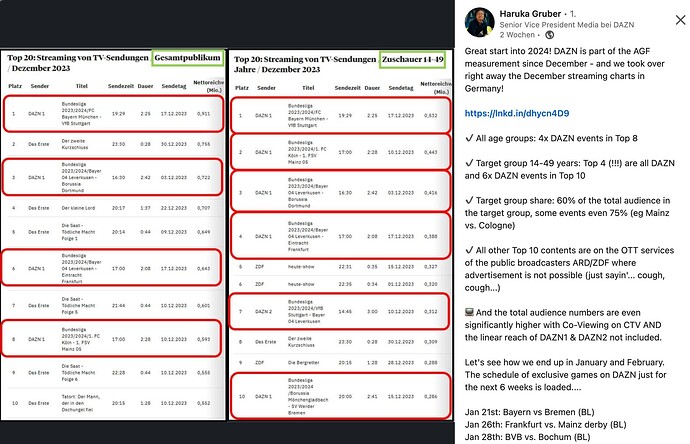Frauenfußball, DAZN, England (WSL)
DAZN gibt seine Pay-Wall-Strategie für Frauenfußball teilweise und vorübergehend auf
Qu: DAZN makes women’s soccer free-to-air in the UK and calls for industry-wide plan for commercial growth - SportsPro ($)
dxciBel hatte das entweder hier im Forum, „drüben“ bei Discord oder en-passant auf einen ihrer Social-Media-Kanäle erwähnt: Mitte Januar kündigte DAZN überraschend an, dass auf zentralen Märkten wie UK oder Deutschland ihre Pay-Wall-Strategie für den Frauenfußball teilweise ausgesetzt wird.
Am offensichtlichsten ist es bei der Champions League der Frauen. Statt nur ein Spiel pro Spieltag FTA zu zeigen, sind alle CL-Spiele nun bei DAZN gegen Registrierung/Login for free zu sehen. Je nach Land werden zusätzlich zahlreiche Spiele nationaler Frauen-Ligen ebenfalls for free angeboten.
SportsProMedia zitiert die „ co-chief executive of women’s sport at DAZN“ Hannah Brown mit Worten, die ich recht alarmierend interpretiere:
“The women’s game is at a crossroads” said Hannah Brown, co-chief executive of women’s sport at DAZN. “We see two possible futures. In one, stakeholders come together to build a major global commercial sport. In the other, progress is slow and a golden opportunity to accelerate growth is lost […] The women’s game has significant commercial potential. The opportunity must be seized now. It requires a venture capital mindset, with an investment horizon measured over several years.”
Dies klingt für mich wie: „Wow, wir dachten das würde abgehen wie Schmitz’ Katze und haben richtig Kohle reingebuttert, Rechte eingekauft und die ata football-Plattform aufgekauft und booooooyyy… keiner will für den stuff sich ein Abo holen, selbst nicht unser Billig-Abo!
Liebe Verbände und Ligen, bitte helft uns! In Liebe, euer Datzn“ – je nach Rechnung nur 1 bis 2 Jahre nach dem man diese Strategie „Anfixen und dann Pay-Wall hochziehen“ gestartet hat.
In einem interessanten Kontrast stehen die Aussagen zweier Frauen aus der Szene von Vermarktungsagenturen…
Ausbau Frauenfußball aus angelsächsischer Sicht
Qu: The big questions for women’s soccer in 2024 - SportsPro
Zwei direkt oder indirekt involvierte Beobachtende fühlen vermutlich den gleichen Schmerz, wollen aber der Nachhaltigkeit willen, eher auf die Bremse treten und eher in den Aufbau einer Reichweite investieren.
“I don’t want it behind a paywall, because we are still a growth sport,” says Tongue, speaking on the SportsPro Podcast. “We are still trying to find our mass audiences. Yes, we’ve got the mass audiences on the international stage – at tournaments, we have ten million people watching the Lionesses […] We’re trying to find out who the audience actually is. Is it current men’s football fans that we’re trying to bring across? Or is it that we’re trying to reach whole new audiences? Is it an amalgamation of both?
“So while you’re still in that phase, I just think don’t shut any doors. You need to keep them open […] What’s happening now is brilliant and exciting, but we should not ruin it by jumping too quickly, and work on the build rather than try and jump.”
(Jo Tongue ist CEO einer Sportagentur mit Spielerinnen und Trainerinnen, u.a. Emma Hayes)
Aus dem gleichem Podcast wird von der Sportagentur Wasserman Lenah Ueltzen-Gabell zitiert:
“It’s not a negative, but people are too quick to do that, and too quick to take the financial investment in order to grow the game,” she says. “I agree with Jo – it’s too early, we need to walk before we can run. We now have people interested and are looking for the content. We now have demand, whether it’s on streaming, whether it’s online, wherever else it is.
But let us be really successful there, before you put it on a paywall. It’s about that long-term game. Because we’ve seen a little bit of success coming off the back of the Lionesses’ amazing Euros, everyone wants to take advantage of it. We just need to slow down.”
Im Kontext der anstehenden TV-Rechteausschreibung der englischen WSL, sagte Ueltzen-Gabell:
“I think it’s more important that we get the coverage that we need, and getting the carrier and the coverage that we need is probably more important than these [financial] numbers,” she explains. I might be in the minority here, it would be a great stamp of approval if we can get that double-digit growth on the rights fees. But to me, it’s more about the what, than it is on the how much. For us right now, it is really about making sure that they do proper investment in the production, and then in the highlights and other pieces.“

